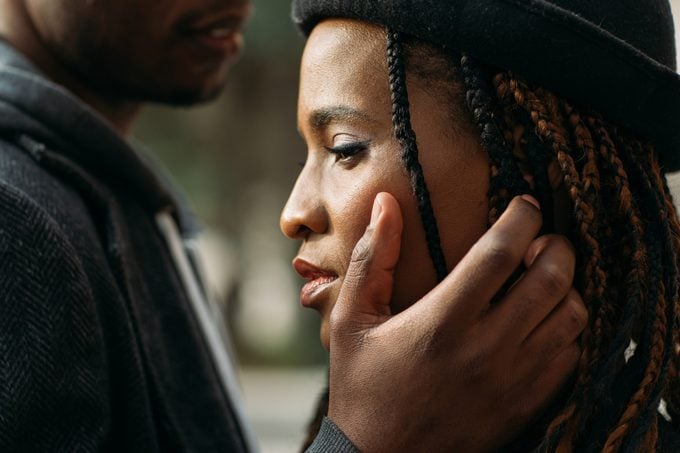What Is Narcissistic Abuse? 6 People Share Real-Life Examples
Updated: Jan. 26, 2021
Narcissistic abuse can be hard to pinpoint. Here, real people share what it was like having a relationship with a narcissist.
Our editors and experts handpick every product we feature. We may earn a commission from your purchases.
Understanding narcissistic abuse
Do you know how to recognize a narcissist? Better yet, do you know the difference between someone with narcissistic tendencies—who may be just a little full of themselves—versus someone with narcissistic personality disorder? Here’s a clue: While the former may be annoying, the latter has a diagnosable condition that has far-reaching consequences.
Being in a relationship with a narcissist—whether it’s a romantic partner or a family member—can have lasting impact.
Narcissistic abuse is the term used by some therapists to describe the negative consequences of being in a relationship with a narcissist. It can take on a number of forms, as the narcissist will go to extreme lengths to avoid taking blame or feeling shame or discomfort, says Elinor Greenberg, PhD, a licensed psychologist and author of Borderline, Narcissistic, and Schizoid Adaptations: The Pursuit of Love, Admiration, and Safety.
These forms can include an unwillingness to accept anyone’s point of view but their own; a tendency to use extreme language; and prioritizing themselves above all others, often to the detriment of their partner. (Find out: can a narcissist change?)
Here, six real people share what it was like being in an intimate relationship with a narcissist, and how they recognized the toxicity and moved through it.

Constantly blamed and walking on eggshells
Von Fisher, a breakup/divorce coach at Phoenix Rising Coaching, shares how one former partner constantly blamed her and others for his failures and how her experience inspired her to pursue her new career.
In my early twenties, I dated a guy who was the king of the blame game. He wouldn’t know “personal accountability” if it slapped him in the face. Our relationship started out on a great note (most narcissists go out of their way to draw you in and lay a solid foundation). We had interesting and thought-provoking conversations and seemed to share similar values and outlooks on life. We had the same interests and had a lot of fun together.
Eventually, though, I noticed that in every disagreement—even if I was justified in my feelings and thoughts—he would always turn the situation around to make it seem like I was at fault and he was the victim. Not only that, he took everything personally.
At first, I attributed it to me needing to be more sensitive. But before you know it, I was walking on eggshells all the time in an effort to not express any thought or opinion that might be contrary to his. Not only would he take it as a personal attack, but he would likely spend the rest of the evening trying to make me believe that my opinion was wrong and his was right. It was always a competition with him.
At some point, I noticed that whenever I asked a question about his background, he would always tell the story in a way that portrayed him as the victim. He blamed one of his college professors for miscalculating his grades, which meant that he wouldn’t be valedictorian. (I later found out he was in the top half of his class, but not even close to being valedictorian.)
He also blamed his parents for preventing him from pursuing his career in the NBA by tricking him to focus on business management instead. (He was only 5 feet, 10 inches and had zero game. So he was as far from being in the NBA as he was from being valedictorian.)
The more I asked questions, the more I noticed a trend. The straw that broke the camel’s back was when he blamed me for his poor performance on a presentation at work. According to him, I cost him the promotion and the thousands of dollars that went with it. This was the a-ha moment that propelled my exit.
Those encounters absolutely influenced my decision to help other women through breakups and divorces. I am a true advocate for releasing expired people, situations, and even mindsets for that matter.
When the switch flips from tender love to vicious manipulation
A relationship with a narcissist can begin as a dream, then quickly turn into a nightmare. Here, someone shares what it’s like when that switch flips.
At first it was intoxicating. I would later learn there is a term for why that is. It’s called “love bombing.” He called and texted constantly, bombarding me with admiration. There was a part of me that felt suspicious of this level of intensity in such a short period of time.
However, I overrode that part because his attention felt amazing. I had been lonely for too long and I rationalized that this all made sense because we were soulmates.
Initially, the steady flow of validation and adoration made it easy to trust and bare my soul in a way that I rarely did with anyone—not even my therapist. I shared all my deepest secrets with him. It felt so safe. There was no judgment, only concern, and what I perceived as genuine empathy.
But the empathy was an act of manipulation. Narcissists do not experience empathy for others; however, many of them are charmers and master manipulators who can fake it in a way that is undetectable to those of us who are desperate to be loved.
As soon as I was hooked, the rug was swiftly pulled out from beneath me. Everything that was shared in confidence was fair game to use against me. Narcissists use vulnerability as a weapon. Nothing was off limits. Not my childhood sexual abuse, not my fears of abandonment or not being enough.
What was shocking was how quickly it turned. One day I was basking in the sweetness of finding true love and the next day I was defending myself against vicious attack.
I felt desperate to get back into his good graces. I racked my brain to figure what I did wrong. I felt like a junkie and his approval was my heroin. I had to have it. This cycle of abuse went on for years. My own issues with substance abuse started to escalate. I could not focus on work and I neglected my personal relationships. It took the unwavering support of my friends, family, and therapist to help me finally end the relationship.
It also took several attempts since he always found the words to pull me back and make me believe that this was all my fault. If only I could stop behaving in ways that “hurt him,” then he would be able to love me. [Here’s what a narcissist does at the end of a relationship.]
I would later learn the term “gaslighting” which is another preferred method of abuse by the narcissist. However, I finally broke free and went full no-contact.
I wish I could say that this was the end of the story, but it was not. The damage was done. It would be another year before I addressed my alcoholism and four years before I could trust myself enough to allow another relationship into my life. I had lost my confidence, self-worth, and the ability to trust my own instincts and perceptions. If you suspect you are the victim of narcissistic abuse, get out as fast as you possibly can and seek help. [Here’s what you need to know about narcissistic abuse syndrome.]
Stunned by extreme selfishness and callousness
Narcissistic abuse is not confined to romantic relationships. Here, a woman shares how she has dealt with her narcissistic sister over the years.
My younger sister is the textbook definition of someone with a “histrionic personality disorder,” which is under the broader narcissism category. After having what has frankly been an exhausting relationship with her throughout our adult lives, I stumbled onto this diagnosis quite by accident. I was taking a 10-week course to serve as a volunteer lay counselor for a local nonprofit, and this information was included in the course material.
Imagine my surprise! I actually wrote her name in the margin of my workbook within seconds of first reading the roster of characteristics.
From the time she was in her 20s, my sister simply wanted to be the center of attention—continually—and had little to no bandwidth when it came to anything resembling reciprocal support. Ever.
The same themes have played out over the years: I help her in what feels like an endless manner only to end up with a “no good deed goes unpunished” response from her on the back end. It eventually became clear to me that dealing with her was like pouring one’s heartfelt effort into a black hole. She just swallows up anything and everything she can scoop up for herself—and that’s that. Sometimes there’s the pretense of a “thank you.” But even on those rare occasions they have a limp-rag, perfunctory quality to them.
The epitome of her selfishness and self-absorption was to go off on me in an obscenity-riddled diatribe via text on the day our mother died—a thread she initiated. She never apologized for this beyond-appalling tirade, which had zero justification. Worse, she recently doubled down, telling me over a year later in an email that she might have chosen her words more carefully, but she basically didn’t regret anything she said.
I have finally realized there simply is no dealing with someone like this who is broken at a very basic level in terms of how their brain and emotions work.
The theme song in our relationship—if you can call it that given our years of off-and-on estrangement—is that: A.) I can never do enough for her, and B.) when I hit my limit and realize I need support around an issue for which she is relentlessly unavailable—and call her on it—then C.) she gets offended because I have the audacity to call her on the one-sidedness of our interactions. So then she’s mad at me.
Just as a snarky political talking head recently said about an activist basketball star who was speaking out about the Black Lives Matter movement—”Shut up & dribble”—I suddenly realized that all my sister ever wanted from me was to “shut up and clap.” That realization was a true epiphany. It also helps me in mentally closing the door on this wholly toxic relationship.
When emotional trauma becomes physical pain
Mental and emotional abuse can manifest in physical ways. Iva Ursano, founder of Amazing Me Movement, shares her experience.
When I first started dating my narcissistic boyfriend, I noticed lots of red flags that I should have heeded. But because my self-esteem and self-love were so low at the time, I ignored them and clung to him hoping that things would get better or he would grow to love me and change. That never happened.
The verbal and emotional abuse got so bad after a couple of years. He sometimes said he was sorry. But mostly he made me believe that everything was my fault and if I “just listened to him and did what he said,” we wouldn’t have this problem.
I continued to hold on to hope, even though his bullying and verbal abuse got so bad it landed me in the hospital with excruciating back pain. I later discovered the pain in my back was from anger and hatred I was carrying for him.
After almost eight years, when I had nothing left inside of me, I finally walked out, with nothing to my name but a thread of hope and what little pride I had left. I slowly started rebuilding my life after I left and now, seven years later, I run a blog to help other people who are in toxic relationships.
Working to un-learn self-doubt
The scars left by a relationship with a narcissist can linger for years. Here, one woman shares her story.
I recently divorced a classic narcissist. We were together for almost nine years, married for five. I am still, and I imagine I will be for some time, trying to shake off a lot of the adaptive behaviors I took on because of his narcissistic abuse.
At best, it now manifests as self-doubt because his voice is still in my head. I’m learning to identify what’s his opinion and what’s mine. When we were together, it was more often that I’d have a difference of opinion, which was never OK. And that would turn into me not only being wrong, but also being bad.
I once asked him to change the subject and I was called names and endured a litany of reasons why I was in the wrong. I was a bad partner for needing something other than what he needed. That’s a small example of how much “training” I had to not have my own needs, my own voice, even my own friends.
One by one, he’d complain about my friends. And his dislike of my friends would then mean something bad about me. My wanting to see them without him began to mean I preferred them to him. So I’d let them go. Until one day I looked around and the only friends I had were his friends and their wives. It took a crisis and an inner revolution for me to leave. (Here’s how to leave an abusive relationship.)
Now I have my own place. I have my own likes and I can be myself in my own home. I find myself feeling like a rebel sometimes if I do something that I know he wouldn’t have liked. And this is almost two years after filing for divorce.
Shutting down to get away
There are different ways to end a relationship with a narcissist. Here, Sarah shares the strategy she used to escape narcissistic abuse.
I was working in publishing at the time and I remember I had to scan a book for one of the publishers. It happened to be that one of the pages I was scanning had the definition of a narcissist on it. I read it as I was scanning, and I was floored. It was exactly the person I was dating.
It still took me a while to end it with him. But I remember knowing so clearly that this definition was the person I was dating, to a T. And that at some point I would have to do something about it.
It was really hard, because it was the first time I’d dated anyone long-term, and I was scared to end it. What I ended up doing was I stopped being the person he wanted me to be. He wanted me to be infatuated with him, obsessed with everything he did, laugh at all of his crude and mean jokes, ignore all his nasty comments, be there exactly when he wanted me to be, ask nothing of him, demand nothing. I stopped doing that. And it took another two months, but eventually he broke up with me.
What to do next
If any of these accounts sound familiar, you may be in a close relationship with someone with narcissistic personality disorder. If you’re concerned that it may progress into something abusive, speak to friends, family, or a therapist about what you’re going through. Doing so can help you look at your relationship through a more objective lens. But if you feel like you’re already in an abusive situation and need help getting out of it, those same people can be a source of support, as can organizations like the National Domestic Abuse Hotline.























